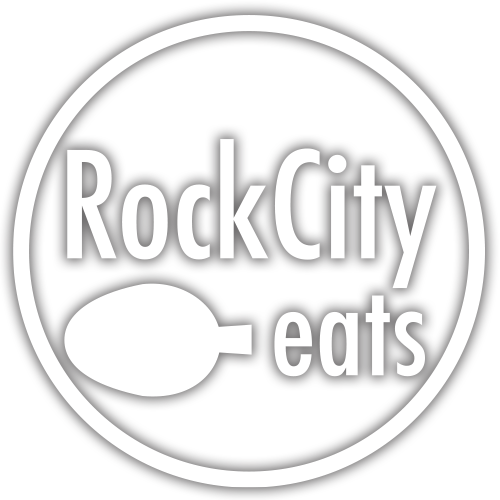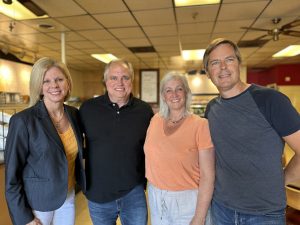I have had the pleasure of working with the majority of the locally owned restaurants in this city over the past six years. Our stance at Rock City Eats has always been to promote and support local dining, and we work daily to help restaurants become and stay successful.
In this journey, one of the things that resoundingly came up when working with local owners is how hard it is to run a locally owned restaurant in Little Rock due to policies and taxes that stifle success and hold back certain areas of the city from growth.
A little over two years ago I decided to try to do something about that. I carefully considered a run for City Director (basically city council) of Little Rock to make a change from the inside on this and a lot of other issues. I believe the local economy is deeply important to building Little Rock’s future, along with caring for our homeless, and local leadership in schools. So this year I ran for City Director of Ward 1 (downtown and east Little Rock).
So how do local politics play a role in our food economy? Here are a few ways and what I hope to do to change it.
Opening/Expanding a Restaurant
When you go to open a restaurant there are numerous permits, approvals, and inspections that have to be complete before you can open the doors. These are great, they help ensure that restaurants are safe to eat at.
The problem comes in how it is executed in Little Rock. To quote a business owner I worked with “I’ve built locations in 7 other cities in Arkansas, Little Rock was by far and away the hardest to get open.” I’ve chatted with many owners about this, they all cite frequently moving requirements, convoluted permitting, lack of accountability, and no clear process to get started. In some cases, delays in the opening have set a restaurant back half a million dollars before they ever open the door. It is nearly impossible to overcome that type of hole in a business that barely makes that much annually as it is.
As City Director I want to advocate for businesses in my area. One of my first jobs was in a city permit/inspection office, so I know my way around. I want to streamline the requirements to get open, then serve as a guide and advisor for restaurants in my area to open and expand. Then work with permitting and variances to build rules that help restaurants grow.
Mixed Drink Tax
This is a big hairy one. The tax on mixed drinks in Little Rock is 33%, making it one of the highest in the country. Being so high, there is no question that it drives down the total spending at bars around the city. Little Rock is a big cocktail town, and restaurants lean on the margins with alcohol sales to help offset smaller margins in food sales.
To put this another way, say you go out for dinner with friends and you all order 3 cocktails at $10 each. You have essentially paid for a 4th cocktail in taxes. Yes, it is a tax on the consumers, but it impacts the overall revenue a restaurant can generate from mixed drinks.
Where does this tax go? Well, 9% of that goes to sales tax, 10% to State mixed drink tax, 10% to City mixed drink tax, and 4% to UAMS. The city cut is set off the state cut because they can charge up to the state level, so naturally, they take it all. The UAMS cut was implemented back in 1989 to help fund a long since complete building project at UAMS, once it was over they just shifted the funds to general revenue and kept going.
As City Director I want to see how we can reduce or eliminate the UAMS portion and gradually reduce the city portion. Here is where the math gets fun. If we can drop the city portion of the tax down 3 points and use that along with a reduction in the UAMS portion to spur mixed drink sales by 50%, we would actually make more money as a city in mixed drink taxes. Plus restaurants would make more in consumption increase. I can’t see a scenario where both increasing tax revenue and increasing profitability for our businesses is a bad thing.
A&P Tax Use
Along with the mixed drink tax, the Advertising and Promotion Board (Little Rock CVB) adds a 2% tax on all restaurant and hotel sales in the city to further promote the city. I think it is a good thing, in theory, it helps the city compete in an overall competitive tourism market.
In practice, however, it is a bit of a tax on the poor. The tax revenues that are taken are used in one specific area of the city, the riverfront area. It has zero impact on restaurants on the south and west side of the city. The Little Rock CVB supposedly spends money to help promote restaurants across the city, this comes from a once a year promotion called restaurant month that is mostly a mess, does not drive in traffic to restaurants, doesn’t even include restaurants in poorer areas, and they didn’t even bother doing the promotion this year.
Staff will tell you it is a tax on consumers, but like the Mixed Drink tax before, it does reduce overall spending at restaurants from locals. Ironically the restaurants who receive the least of the benefit from A&P promotions are also the ones who rely most on local spending to keep up. You are starting to see the problem I hope.
To make matters worse our CVB has one of the largest staff per capita in the United States, so a good portion goes to staffing. Plus we operate venues that often run at a loss like the Ottenheimer Market Hall and The Robinson Center.
As I said, I think the CVB and A&P tax overall is a good thing. What I want to see however is a stronger and more balanced use of the money so that the reduction in overall spending due to A&P tax is overcompensated by an increase in traffic as a result of promotions by the A&P board. This needs to happen city wide, not just in the Riverfront area.
There are a lot of other issues that constantly impact our local food economy. Crime, parking, patio zoning, various ordinances, and more that all must be considered when promoting a healthy local business and food economy. As city director, I want to help businesses grow, and grow in underserved areas to make the overall economy stronger.
If you live in Ward 1 which is mostly downtown and the east side of the city, I would appreciate your support. If not please ask your local representatives how they plan to grow the local economy and the local food scene. Elections matter.
In this journey, one of the things that resoundingly came up when working with local owners is how hard it is to run a locally owned restaurant in Little Rock due to policies and taxes that stifle success and hold back certain areas of the city from growth.
A little over two years ago I decided to try to do something about that. I carefully considered a run for City Director (basically city council) of Little Rock to make a change from the inside on this and a lot of other issues. I believe the local economy is deeply important to building Little Rock’s future, along with caring for our homeless, and local leadership in schools. So this year I ran for City Director of Ward 1 (downtown and east Little Rock).
So how do local politics play a role in our food economy? Here are a few ways and what I hope to do to change it.
Opening/Expanding a Restaurant
When you go to open a restaurant there are numerous permits, approvals, and inspections that have to be complete before you can open the doors. These are great, they help ensure that restaurants are safe to eat at.
The problem comes in how it is executed in Little Rock. To quote a business owner I worked with “I’ve built locations in 7 other cities in Arkansas, Little Rock was by far and away the hardest to get open.” I’ve chatted with many owners about this, they all cite frequently moving requirements, convoluted permitting, lack of accountability, and no clear process to get started. In some cases, delays in the opening have set a restaurant back half a million dollars before they ever open the door. It is nearly impossible to overcome that type of hole in a business that barely makes that much annually as it is.
As City Director I want to advocate for businesses in my area. One of my first jobs was in a city permit/inspection office, so I know my way around. I want to streamline the requirements to get open, then serve as a guide and advisor for restaurants in my area to open and expand. Then work with permitting and variances to build rules that help restaurants grow.
Mixed Drink Tax
This is a big hairy one. The tax on mixed drinks in Little Rock is 33%, making it one of the highest in the country. Being so high, there is no question that it drives down the total spending at bars around the city. Little Rock is a big cocktail town, and restaurants lean on the margins with alcohol sales to help offset smaller margins in food sales.
To put this another way, say you go out for dinner with friends and you all order 3 cocktails at $10 each. You have essentially paid for a 4th cocktail in taxes. Yes, it is a tax on the consumers, but it impacts the overall revenue a restaurant can generate from mixed drinks.
Where does this tax go? Well, 9% of that goes to sales tax, 10% to State mixed drink tax, 10% to City mixed drink tax, and 4% to UAMS. The city cut is set off the state cut because they can charge up to the state level, so naturally, they take it all. The UAMS cut was implemented back in 1989 to help fund a long since complete building project at UAMS, once it was over they just shifted the funds to general revenue and kept going.
As City Director I want to see how we can reduce or eliminate the UAMS portion and gradually reduce the city portion. Here is where the math gets fun. If we can drop the city portion of the tax down 3 points and use that along with a reduction in the UAMS portion to spur mixed drink sales by 50%, we would actually make more money as a city in mixed drink taxes. Plus restaurants would make more in consumption increase. I can’t see a scenario where both increasing tax revenue and increasing profitability for our businesses is a bad thing.
A&P Tax Use
Along with the mixed drink tax, the Advertising and Promotion Board (Little Rock CVB) adds a 2% tax on all restaurant and hotel sales in the city to further promote the city. I think it is a good thing, in theory, it helps the city compete in an overall competitive tourism market.
In practice, however, it is a bit of a tax on the poor. The tax revenues that are taken are used in one specific area of the city, the riverfront area. It has zero impact on restaurants on the south and west side of the city. The Little Rock CVB supposedly spends money to help promote restaurants across the city, this comes from a once a year promotion called restaurant month that is mostly a mess, does not drive in traffic to restaurants, doesn’t even include restaurants in poorer areas, and they didn’t even bother doing the promotion this year.
Staff will tell you it is a tax on consumers, but like the Mixed Drink tax before, it does reduce overall spending at restaurants from locals. Ironically the restaurants who receive the least of the benefit from A&P promotions are also the ones who rely most on local spending to keep up. You are starting to see the problem I hope.
To make matters worse our CVB has one of the largest staff per capita in the United States, so a good portion goes to staffing. Plus we operate venues that often run at a loss like the Ottenheimer Market Hall and The Robinson Center.
As I said, I think the CVB and A&P tax overall is a good thing. What I want to see however is a stronger and more balanced use of the money so that the reduction in overall spending due to A&P tax is overcompensated by an increase in traffic as a result of promotions by the A&P board. This needs to happen city wide, not just in the Riverfront area.
There are a lot of other issues that constantly impact our local food economy. Crime, parking, patio zoning, various ordinances, and more that all must be considered when promoting a healthy local business and food economy. As city director, I want to help businesses grow, and grow in underserved areas to make the overall economy stronger.
If you live in Ward 1 which is mostly downtown and the east side of the city, I would appreciate your support. If not please ask your local representatives how they plan to grow the local economy and the local food scene. Elections matter.





